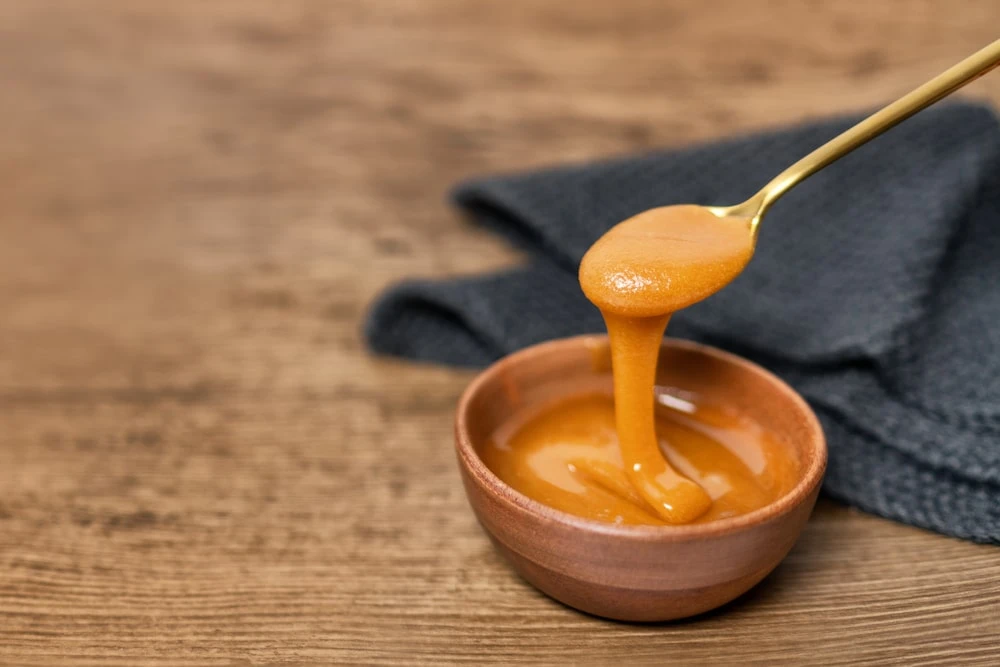PET HEALTH
Who doesn't love honey? This popular sweetener has been used for thousands of years for a number of reasons. It’s no wonder why people try to stretch honey’s versatility as far as they can, including in their pets’ lives.
Many puppy parents wonder if their dogs can have honey. The short and sweet answer is yes, dogs can have honey. According to the American Kennel Club, honey is safe for dogs to eat in small quantities.2
Before you give your dog a spoonful, you should consult your veterinarian much like you would with any other change in your dog’s diet. It’s also important to learn the best way to serve your dog honey and its potential issues. Keep reading to learn what’s safe.
How Can Dogs Eat Honey?
Dogs can eat most kinds of honey, but raw honey and manuka honey are especially great for dogs. Commercial or store-bought honey is also safe. Just keep in mind that those plastic bear bottles are mostly processed sugar and don’t provide much nutritional value.
Although honey is safe for dogs to eat, there is the chance of feeding them too much. According to Kristin Wuellner, DVM, most dogs can have a single teaspoon of honey per day.3 The amount that’s best for your dog will depend on their size and age. As mentioned, speak with your vet for their guidance before adding any honey to your dog’s diet.
Honey is also a great sweetener option if you like to make homemade dog treats.
How Is Honey Good for Dogs?
Honey is a safe way for your dog to enjoy natural sugars and it also has small amounts of vitamins, minerals, and antioxidants. Common vitamins and minerals in honey include:
● Iron
● Vitamin A
● Vitamin B
● Vitamin C
● Vitamin E
● Vitamin K
● Zinc
Raw honey also has anti-fungal, antimicrobial, and anti-inflammatory properties.
Potential health benefits of honey for dogs
Some people believe honey can help with a few common ailments in dogs. These claims are anecdotal though, as there are not many conclusive studies to validate them. As always, you should talk with your vet before treating any health conditions at home. Here are some ways honey could possibly help your pooch’s health:
● Allergy relief: Raw honey is often believed to help those with seasonal allergies. Assuming your dog is sensitive to flower pollen, honey may help relieve their symptoms. But keep in mind honey is not guaranteed to help.
● Cough: If your dog has a cough or sore throat, a little bit of honey could provide some relief. But honey may not be an effective treatment for serious issues like kennel cough. Before treating a cough with honey, consult your vet. They’ll be able to identify the issue and give specific treatment instructions.
● Hypoglycemia: If your dog has hypoglycemia, honey may be able to help when their sugar drops. Consider giving your dog a small amount or rubbing a bit of honey on your dog's gums. Always follow your vet’s health plan to manage your dog’s low blood sugar.
● Upset stomach: Depending on the cause and severity of your dog’s upset stomach, honey may be able to soothe the issue. Again, confirm the issue with your vet as some symptoms can be a sign of a serious issue.
● Wound care: Because of its anti-inflammatory properties, honey may be helpful in soothing a dog’s dry skin or hot spots. In a 2020 study, researchers also found that medical-grade honey and manuka honey could be used in some cases as an effective topical antibiotic.4 Again, confirm your dog’s needs with your vet.
If you’re concerned about your dog's health, learn how pet insurance works and why it may be right for you and your pup.
When Is Honey Bad for Dogs?
Honey can be a bad choice for some dogs, and most dogs will experience digestive issues if they eat too much.
While raw honey is often recommended over store-bought brands, raw honey shouldn’t be given to immunodeficient dogs or puppies. Raw honey could contain botulism spores, a toxin that can cause paralysis. Puppies and dogs with compromised immune systems are more susceptible to bacterias and toxins like botulism.
Honey is also not for dogs with diabetes or obesity. Because of its high sugar content, honey can lead to issues for diabetic or obese dogs. If you’re looking for a healthier snack option for dogs with these issues, there are plenty of foods dogs can eat that are a better alternative to honey.
The Buzz on Honey for Dogs
Honey can make for a fun treat or soothing salve for your dog. Just remember that dogs should only enjoy honey in small amounts, and you should always consult your vet. Honey may have some health benefits for your pup, but nothing replaces the care your veterinarian provides.


